Ginger Benefits: 26 Health, Skin & Hair Uses
From respiratory problems to heartburn – this root plant is a miracle worker for all sorts of health issues.
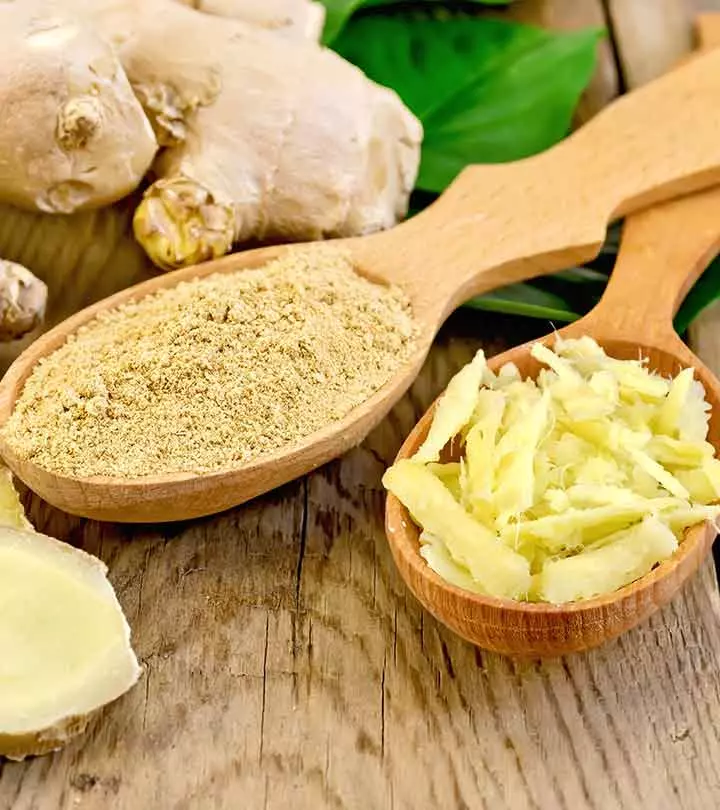
Image: Shutterstock
Ginger benefits you in multiple ways. It is one of the most used ingredients in Ayurveda. Even though it is considered a root, it is actually an underground stem (i.e., a rhizome). It has been used as a spice for approximately 4000 years. However, its medicinal properties were discovered around 2000 years ago.
Ginger’s strong taste and unique pungent aroma make it ideal for usage in various delicacies. It is also used in many medicines. Tea made with ginger is common in Indian households and is an effective remedy for cough and cold. As its benefits are becoming more popular, many Western cuisines are using ginger in their dishes now. Gingerbread, ginger cake, ginger snaps, and ginger ale are some of them. Learn more about ginger and the array of benefits it offers below. Keep reading to know more!
 Know Your Ingredient: Ginger
Know Your Ingredient: GingerWhat Is It?
A flowering plant that belongs to the Zingiberaceae family, best known for its aromatic, spicy, and slightly sweet flavor, which comes from its rhizome or root.
What Are Its Benefits?
It may treat respiratory problems, aid in digestion, and weight loss, ease menstrual cramps, relieve heartburn, and enhance skin and hair health.
Who Can Use It?
It is safe for all except for those who are taking blood thinning, high blood pressure, and diabetes medication.
How Often?
It can be consumed daily but in moderation.
Caution
It may cause mild heartburn, diarrhea, and stomach upset. Pregnant and breastfeeding women should consult a doctor before consuming it.
In This Article
Benefits Of Ginger For Health
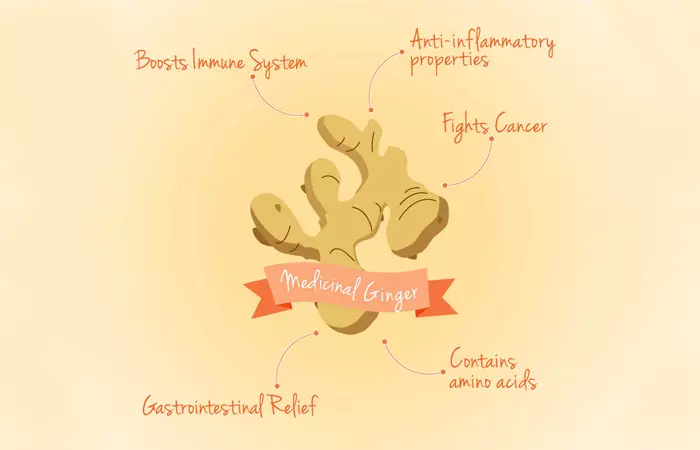
Ginger is considered the ‘chest of medicine’ in Ayurveda due to its various health benefits. Its powerful therapeutic and preventive effects make it usable in the treatment of various ailments. Here are some of the medicinal uses of ginger.
1. Treatment Of Respiratory Problems
Due to its antihistamine properties, ginger is effective in treating allergies (1). It inhibits airway contraction and helps in stimulating the secretion of mucus. For centuries, it has been used as a natural remedy for colds and flu. A teaspoon of ginger juice and honey is effective in relieving the persistent cough and sore throat associated with colds. There are also plenty more benefits of ginger tea. For instance, it helps to get rid of congestion of the throat and the nose. A mixture of fresh ginger juice and fenugreek is helpful in curing asthma and thus aiding improved respiratory health. Ginger is also found to be helpful in treating stomach flu or food poisoning. This is one of the most applied uses of ginger.

2. Aids Digestion
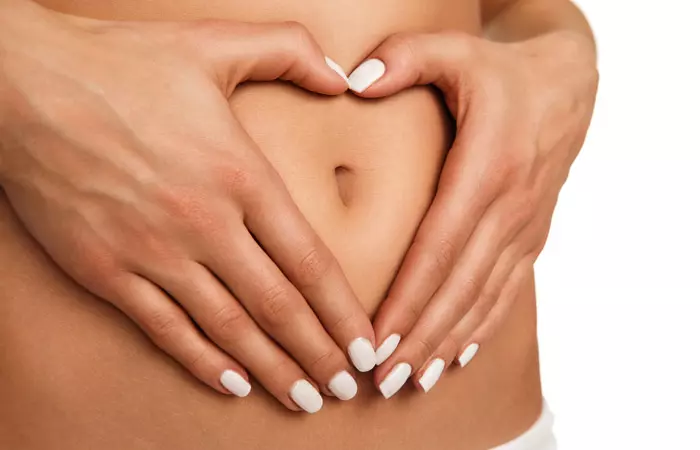
Ginger is considered the best herb for digestion (2). Consumption of ginger encourages the gallbladder to release bile, stimulating digestion. This encourages the assimilation of nutrients from the food we eat. In addition to this, ginger also provides relief from stomach cramps, diarrhea and bloating caused due to gastritis. We can take ginger in the form of tea or supplements to aid digestion.
3. Chemotherapy Nausea

Chemotherapy is a treatment recommended after the cancer surgery to eliminate the presence of the cancerous cells so that the chances of recurrence of this disease can be minimized. Ginger root supplements are helpful in reducing nausea induced by the chemotherapy when administered along with the other anti-vomiting medications. According to a lead researcher at the American Society of Clinical Oncology meeting, Florida, Dr. Julie Ryan, more than 70 percent cancer patients who are exposed to chemotherapy radiations experience vomiting and nausea. The intake of ginger root supplement or juice before the chemotherapy reduces nausea and vomiting symptoms as the ginger root provides anti-inflammatory properties to the body. It is also found to be effective in treating sensations of nausea associated with motion sickness, sea sickness, and migraines (1)
4. Treatment Of Morning Sickness
Research has proved that ginger is as effective as vitamin B6 in treating morning sickness (3). Thus, it is often recommended to pregnant women for preventing morning sickness.
Key Takeaways
- Ginger may help soothe irritated skin and fight inflammation.
- Its antioxidants may prevent skin diseases and cancerous cell growth.
- Consume it to improve circulation or apply it topically to promote hair growth and prevent balding.
- Use it as a natural remedy for nausea and morning sickness.
- Its regular consumption may improve blood pressure, blood sugar levels, and cholesterol levels.
How To Take Ginger For Nausea
For Children
- Ginger should not be given to children under the age of 2.
- Children over the age of 2 may take ginger as a natural remedy for nausea, headaches and stomach cramps. However, you should consult a doctor for the appropriate dose.
For Adults
- In general, you should not exceed 4 grams of ginger per day. It is also important to keep in mind that pregnant women should not take more than 1 gram per day.
- For nausea, indigestion or gas: As you have already learned, some studies have used 1 gram of ginger per day in doses that are divided. You should consult your doctor to find the dose that is right for you.
For Nausea During Pregnancy
In some studies, 650 milligrams to 1 gram a day have been used to treat nausea induced by pregnancy. You should consult your doctor to make sure that it is safe for you to take ginger while you are pregnant.
5. Anti-Inflammatory
Ginger is very beneficial for treating chronic inflammation. It provides substantial relief from pain caused due to inflammation and even decreases swelling and morning stiffness. It successfully inhibits cyclooxygenase and five-lipoxygenase-enzymes that cause inflammation. The anti-inflammatory properties of ginger help increase serotonin and dopamine levels in the brain, thereby improving brain function.
According to a study conducted by the University of Michigan Medical School, ginger root supplement, when administered to the people suffering from colon inflammation, was found to be very effective in alleviating the condition. The co-researcher, Suzanna M. Nick, who was a part of the study, has stated that a reduction in the colon inflammation helps reduce the chances of developing cancer in the colon (4).
6. Reduction Of Pain

The analgesic and anti-inflammatory properties of ginger are effective in reducing the pain and swelling in the patients suffering from osteoarthritis of the knee, rheumatoid arthritis, and general muscle discomfort (5). Ginger root provides pain relief and is especially beneficial for those who have to take a painkiller to reduce the arthritis inflammation. Adding ginger oil to your bath can help relieve muscle and joint ache. In case of muscle strain, you can apply a mixture of warm ginger paste and turmeric for relief. If such patients incorporate ginger root supplements regularly in their diet, their need for painkiller medication will be reduced considerably. Thus, ginger is very beneficial for relieving pains caused due to rheumatoid arthritis and osteoporosis.
Ginger can be used both externally and internally to treat inflammation. To prepare a ginger bath, boil 100 ml of water with a few slices of ginger. Cover the vessel to prevent volatile oils from evaporating. Leave it aside for 10 minutes and then add this mixture to your regular bath water. Using this water every day can help ease aches and pains associated with fibromyalgiai A condition that causes widespread pain, difficulty sleeping, exhaustion, and, in many cases, emotional and mental distress. .
7. Menstrual Cramp Relief

Taking ginger at the beginning of the menstrual period can reduce the symptoms of menstrual pain in some women (6). Ginger tea with brown sugar is often used in the treatment of menstrual cramps in Chinese medicine.
8. Manages Glucose Levels
Australian research scientists have suggested that ginger can lower the blood glucose levels in the body. Since the glucose levels have a direct impact on your weight gain or weight loss process along with how lethargic or energetic you feel all through the day, the regular intake of ginger root supplements in any form can bring a noticeable change in your levels of blood sugar (7). People who are more prone to low sugar levels should always incorporate ginger root supplements in their regular diet to avoid such problems. Ginger has been found to be effective in reducing the incidence of diabetic nephropathy (kidney damage).
9. Anti-Flatulence
Ginger can calm an upset stomach, thanks to its carminative (gas expulsion) property. Thus, it provides relief from bloating and gas and helps reduce flatulence (2). It is advisable to take ginger in doses of 250 to 500 mg, 2 to 3 times a day, to get relief from flatulence.
10. Relief From Heartburn

Ginger has been used as a natural remedy for the treatment of heartburn (2). Ginger tea is very effective for this purpose.
11. Promotes Weight Loss
If you want to lose weight, then ginger root can be of great help as it plays an integral role in the process of weight loss. It is touted as one of the biggest fat burners as it not only promotes general weight loss, but also eliminates the stubborn fat from your body. Ginger may also help improve metabolism, aiding weight loss (1). Ginger root supplements make you feel satiated after you eat a meal, even in small portions. This limits your food intake, thereby causing weight loss.
12. Lowers Cholesterol And Blood Pressure
The antioxidant properties of the essential oils in the ginger root are highly effective in treating joint problems, fevers, coughs, toothaches, bronchitis, rheumatoid arthritis, osteoarthritis and easing the symptoms of tendonitis (1). Some studies have revealed that the ginger root supplements can lower cholesterol and blood pressure. It also helps prevent internal blood clots and improves heart health.
13. Enhances Immunity

A strong immune system can keep all the diseases and infections at bay. Instead of taking medications to treat a particular disease or a condition, it is always better to take measures to prevent them. Ginger root extract is quite helpful in improving the immunity of your body (8). The regular consumption of ginger in small amounts reduces the risk of stroke by eliminating the fatty deposits within the arteries and keeping the blood circulation free.
14. Eliminates Free Radicals
Ginger ale has antioxidant properties that help in the elimination of free radicals, which may be a result of metabolic reactions within your body (5). This, in turn, leads to the protection of the tissues in your body from damage. The body’s cells can also be damaged by free radicals as the walls of these cells are fragile. When this damage occurs, cell mutation is the result. Cells that are mutated cause the development of medical problems like rheumatism, arthritis, and cataracts.
15. Warms The Body
The thermal effect that ginger ale helps in keeping the body warm and protects it from the cold. Researchers have found that ginger’s heat-generating properties are confirmed by its ability to dilate the blood vessels. This helps in keeping your body protected from hypothermia and other medical conditions that are caused by cold weather. Biological functioning is also supported as blood flow is stimulated due to the dilation of blood vessels (9).
16. Helps In Dissolving Kidney Stones
People with kidney problems can benefit immensely from the regular intake of ginger ale. It is well-known as a natural remedy that helps in dissolving kidney stones (10). To avoid surgery for this problem, drink this ale regularly and dissolve the stones naturally.
17. Helpful In Self-Improvement
Ginger oil is also helpful in improving your concentration so that you can meditate and excel in your spiritual practices. Research says that ginger oil attacks the negative points within you and increases your self-confidence. It restores your internal energy balance due to which you feel positive and motivated to stick to your goals and try to overcome the hurdles. Ginger oil is instrumental in eliminating the negative aspect of your personality so that you change for the better.
18. Treating Cellulite
Ginger essential oil is effective in reducing cellulite and symptoms of varicose veinsi Also known as spider veins or varicosities, they are a result of the veins becoming swollen, dilated, and overfilled with blood. (11). However, in case you have a very sensitive skin, you should use it in combination with other essential oils such as cypress or rosemary.
19. Relieves Upset Stomach
The roots of ginger are rich in chemicals such as shogoals and gingerols. When you consume the ginger extract in any form to get relief from stomach upset, these chemicals soothe the intestinal tract, thereby preventing motion sickness, giving relief from vomiting, nausea, diarrhea, and colicky stomach crampsi A sudden, acute, localized gastrointestinal or urinary discomfort that tends to come in waves that resemble spasms. (1). Since ginger eliminates the basic factors causing stomach upset, it is equally effective in treating stomach flu.
1. Using Fresh Ginger For Upset Stomach
- Take a small piece of fresh ginger and slice it into small pieces.
- Sprinkle some salt over the ginger slices evenly so that each piece of ginger is covered with some amount of salt.
- Chew these slices one by one all through the day continuously.
- You can also add the ginger slices to your recipes for improving digestion and preventing stomach problems.
2. Ginger And Carrot Juice
- Wash the ginger root properly.
- Peel the ginger of one-inch size and cut it into thin slices.
- Take one apple and around 3 to 5 baby carrots and cut into small pieces.
- Blend the ginger, carrots, and apple in a mixer and strain.
- Add a teaspoon of lemon juice to it prior to drinking.
- This drink is effective in treating chronic stomach pain and disorders.
3. Ginger And Ghee (clarified butter)
- Crush a small piece of ginger to extract juice from it.
- Mix one teaspoon of ginger juice with 1/2 teaspoon of clarified butter or ghee.
- Stir using a spoon and consume this mixture to get immediate relief from abdominal pain.
- You can use this remedy to treat your regular stomach problems and pain.
- It is quite safe for daily intake.
Treating Stomach Gas And Bloating With Ginger
Treatment Method: 1
- Wash and peel a fresh piece of ginger and extract juice from it.
- To the ginger juice, add a small amount of sugar and add both these ingredients to a glass of warm water.
- Drink it to get quick relief from all types of bloating and gas troubles including flatulence.
- You can simultaneously also rub the ginger essential oil on the stomach to expedite the recovery process.
Treatment Method: 2
- Take a teaspoon each of black pepper, ginger powder, coriander seeds and dried mint leaves.
- Grind all these ingredients and make a fine powder.
- Take one teaspoonful of this powder twice a day with warm water to get quick relief from stomach upset.
- You can use this same treatment for treating gas trouble and indigestion. It can be stored for a long time in an airtight container.
Using all these methods, you can effectively treat different types of stomach problems. You can also prevent your body from the onset of stomach diseases, as ginger is also effective in eliminating the toxic free radicals from your body.
20. Cures Arthritis
Owing to the serious side effects of conventional NSAID medications that are used to treat arthritis pain, doctors and researchers are seeking newer and alternative remedies. Using ginger comes across as a potent alternative in this regard. This herb, used since ancient times for culinary needs, can be effective in treating arthritis pain (12). It has proven anti-inflammatory properties and using it is safe for most people, both topically and internally.
Skin Benefits Of Ginger
In addition to its medicinal value, ginger has been used in skin care as well. It is often used in a number of commercial products to improve skin health. Ginger juice is often applied topically to treat several skin issues. Given below are the ginger benefits for skin:
21. Anti-Aging Benefits

Ginger contains around 40 antioxidant compounds that protect against aging. It improves the appearance of your skin by removing the toxins and stimulating the circulation, resulting in the delivery of more nutrients to the skin. The antioxidants prevent damage from the free radicals, thus preserving the youthful appearance of the skin. It improves the elasticity, making your skin more firm and youthful. It can also help lighten the skin due to its anti-inflammatory properties (13).
22. Clears Blemishes And Acne

Being a powerful antiseptic and cleansing agent, ginger helps in keeping the skin clean, smooth and free of blemishes. Besides, it also invigorates and stimulates your skin. It is also the best natural acne-fighting weapon as it minimizes the rate of acne formation and eruption by killing and clearing the acne-causing bacteria (14).
23. Treatment Of Hypopigmented Scars (White Scars)
Hypopigmented scars occur when the skin loses its pigmentation, and are generally white or much lighter than the actual skin tone. Ginger can reduce the appearance of hypopigmented skin to a significant extent (15). All you need to do is cut a sliver of fresh ginger and dab it on the hypopigmented areas and leave it for some time. You will see a slight improvement within a week or two. However, this should be done every day without fail for noticeable results.
24. Tones Skin
Ginger is known for its aphrodisiac, antioxidant and toning properties, which contribute to radiant skin. You can prepare a simple mask by mixing two grated gingers with two tablespoons of honey and one teaspoon of lemon juice and refrigerate it for at least 30 minutes. Apply it on your face and rinse with cool water after 30 minutes. This will nourish and soften your skin and prevent aging.
25. May Treat Inflammatory Skin Diseases
Ginger may help treat certain inflammatory skin conditions like eczema and psoriasis. A study suggests ginger is an alternative psoriasis treatment due to its anti-inflammatory properties (16). It blocks a specific protein called NF-kβ, known to trigger inflammation, by lowering its activity and calms the skin.
Ginger Benefits For Hair
Ginger has been used for hair treatment for centuries in Ayurvedic medicine, which relies on herbs for the treatment of ailments. Ginger oil is particularly beneficial in this regard as it stimulates the hair growth. Thus, ginger is beneficial for your hair in the following ways.
26. Stimulates Hair Growth

Ginger increases the scalp circulation, resulting in the flow of blood to the scalp. Thus, it stimulates the hair follicles and encourages hair growth in mice (17). The fatty acids present in ginger aid hair growth and are give volume to thin hair. You can make a hair mask by grating one tablespoon of ginger root in a small bowl and adding one tablespoon of jojoba oil to it. Massage your scalp with this mixture in circular motions and leave for 30 minutes or longer. Rinse off and shampoo as usual. This will combat hair loss and thinning hair and stimulate hair growth.
Tips For Cooking
1. Homemade Ginger Ale
A lot of people nowadays prefer to make their own ginger ale at home. You will be surprised to know just how easy it is. You do not need a lot of ingredients, and you do not have to spend a lot of money. In fact, one of the perks of making your own ginger ale is that you get to save cash while making a drink with ingredients that you know are fresh. If you want ginger ale that is 100% natural, make one in your very own kitchen with no fuss.
To make ginger ale at home, all you need is:
- Fresh, organic sliced ginger – 1 ½ cup
- Fresh lemon juice – ½ cup
- Sugar – 1 ½ cup
- Club soda – 1 liter
Directions
- Mix the ginger, sugar, and water in a saucepan and bring to a boil. Stir well to make sure that the sugar dissolves completely.
- Lower the heat and simmer for 15 minutes, until it turns into syrup.
- Strain and then let it cool down to room temperature.
- Add the lemon juice and stir.
- Add the club soda and mix well.
With this recipe, you can make eight glasses of delicious ginger ale.
 Trivia
Trivia2. Ginger Tea
Ginger is often used as a flavoring agent and adds a kick of spice to your tea. It feels soothing and is great to warm up your body during cold winter days.
To make ginger tea at home, you will need:
- Water – 2 cups
- Fresh ginger root – 2 tablespoons
- Lemon juice – 1 tablespoon
- Honey (to taste)
Directions
- Peel the ginger and thinly slice it. You can grate it to make the tea spicier.
- Boil water and ginger in a saucepan for 10 minutes.
- Reduce the heat to low and let it simmer for 10-15 minutes.
- Cover the pan with a lid and let the ginger steep for 10 more minutes.
- Then, remove it from the heat, strain the tea, and add honey and lemon juice to taste.
This is how you can prepare ginger tea at home. Now let’s learn about the nutritional profile of ginger in the following section.
Taiba Rana, a blogger, shared her personal experience with using ginger root for anxiety relief. She writes, “I felt stress relief as soon as I incorporated ginger into my diet…. I handled the stressful week I worked as a self-employed individual with ease compared to previous weeks. My to-do list was only sometimes on my mind, and I wasn’t panicked about completing everything. Because my erratic ideas stopped, I slept better. I felt less overwhelmed and had more energy. The only change I made to my routine was drinking ginger tea every morning that week, yet I felt like a weight had been lifted (i).”
Ginger Nutrition Facts
Ginger has a great nutritional profile comprising of protein, calcium, iron, folic acid, carbohydrates, sugar, soluble and insoluble fiber, sodium, vitamins, minerals, fatty acids, and amino acids, making it a source of valuable dietary elements.
| Fresh, Nutrient value per 100 g (Source: USDA National Nutrient data base) | ||
| Principle | Nutrient Value | Percentage of RDA |
| Energy | 80 Kcal | 4% |
| Carbohydrates | 17.77 g | 13.5% |
| Protein | 1.82 g | 3% |
| Total Fat | 0.75 g | 3% |
| Cholesterol | 0 mg | 0% |
| Dietary Fiber | 2.0 g | 5% |
| Vitamins | ||
| Folates | 11 µg | 3% |
| Niacin | 0.750 mg | 4.5% |
| Pantothenic acid | 0.203 mg | 4% |
| Pyridoxine | 0.160 mg | 12% |
| Vitamin A | 0 IU | 0% |
| Vitamin C | 5 mg | 8% |
| Vitamin E | 0.26 mg | 1.5% |
| Vitamin K | 0.1 µg | 0% |
| Electrolytes | ||
| Sodium | 13 mg | 1% |
| Potassium | 415 mg | 9% |
| Minerals | ||
| Calcium | 16 mg | 1.6% |
| Copper | 0.226 mg | 25% |
| Iron | 0.60 mg | 7.5% |
| Magnesium | 43 mg | 11% |
| Manganese | 0.229 mg | 10% |
| Phosphorus | 34 mg | 5% |
| Zinc | 0.34 mg | 3% |
Gingerol: Gingerol is a yellow, pungent oil in ginger that is responsible for imparting its intense flavor. Its chemical structure is similar to that of capsaicin, the compound that gives hot peppers their spicy flavor. Gingerol possesses anti-inflammatory properties and is a blood sugar modulator. Moreover, it regulates two important enzymes that manage type-2 diabetes and inhibits cyclooxygenase, an enzyme that promotes inflammation.
- Shogaol: It is a phenolic compoundi It refers to natural bioactive substances found primarily in plant tissues that include simple phenols, phenolic acids, and flavonoids. that has been found to possess substantial anti-inflammatory and anticancer properties, making it effective against breast cancer. They have greater anti-inflammatory and antitumor effects than gingerol, resulting in cancer prevention, especially in the case of lung and colon cancers.
- Vitamins And Minerals: Vitamin B6 is also effective in reducing inflammation. A 1 oz. serving of ginger provides about 2.5 % of the recommended daily value (DV) of vitamin B6. Fresh ginger has a higher content of vitamin B6 than dried or sugar cured ginger as drying or adding sugar can destroy vitamin B6. Ginger also contains modest amounts of important minerals. An ounce of ginger provides about 2 to 3% of the recommended DV of magnesium, potassium, copper and manganese. Potassium is vital for maintaining the electrolyte balance in the body fluids, magnesium aids in muscle relaxation, copper manages the blood sugar and bone metabolism, and manganese is a component of the antioxidant enzyme superoxide dismutase.
 Trivia
TriviaWhat Can You Do With Ginger Root?

A flavorful paste for curry can be made by mixing dried or fresh ginger root with onion, cumin, garlic, tomato, cilantro and mustard seeds. This combination is blended in the mixer and is added to innumerable varieties of soups, meat and vegetable curries.
- Traditionally it is used in lemon, spondias and lemon pickle preparation.
- Fresh ginger roots are also used to prepare different types of candies, gingerbread and biscuits and spicy snacks.
- Ginger tea is one of the most popular drinks in the world, especially in the Asian countries.
- Ginger root juice is used as a garnishing syrup by combining it with apples, lemon juice, and carrot.
- Grated ginger root is sprinkled on different types of desserts to enhance the flavor.
- Some of the most popular recipes of ginger root include ginger candies, pumpkin ginger cupcakes, ginger syrup for making ginger ale, ginger flavored pancakes and more.
Guidelines
- Ginger can be taken in both fresh and dried forms for various medicinal purposes. It is available in the form of oil, capsules and tinctures.
- Ginger is generally free of side effects, but some people might experience mild heartburn, diarrhea and stomach upset. People suffering from gallstones should consult their doctor before consuming ginger.
- Pregnant and breastfeeding women should not take ginger supplements without consulting their doctor. Ginger may interact with blood thinning, high blood pressure and diabetes medication.
- Ginger is readily available in most Indian kitchens. Sip on ginger tea, or use it as a supplement, you are sure to derive huge benefits from this wonder herb!
So how about growing ginger on your own? Just plant the ginger root in the soil and see it multiply within a couple of weeks to give you the supply of fresh ginger root every day. It needs little maintenance and provides great benefits. Moreover, when you grow it organically without any pesticides, the effect of the ginger root compounds gets enhanced.
Infographic: Interesting Facts About Ginger
Ginger is a common ingredient used in Southeast Asian households. It has been used for centuries for its therapeutic benefits. We have compiled a list of interesting facts about this spicy rhizome. Check out the infographic below to learn more! Illustration: StyleCraze Design Team
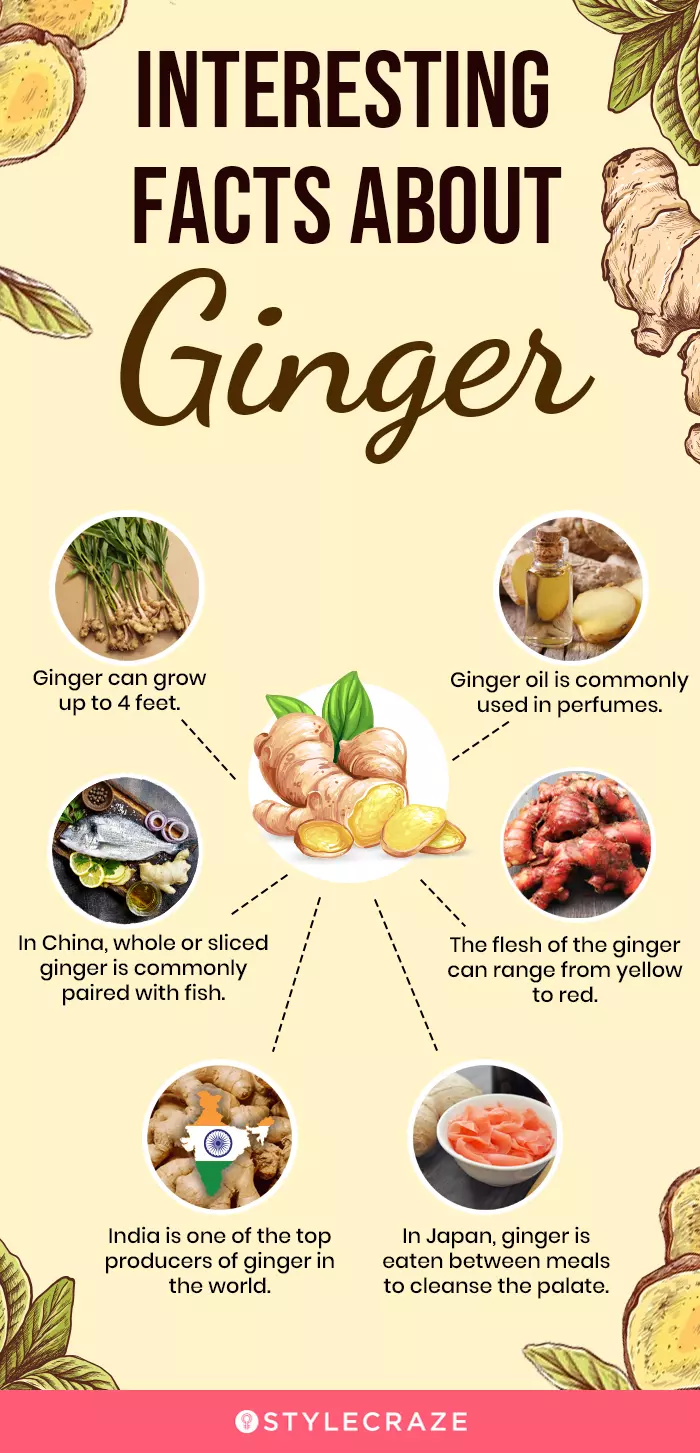
The benefits of ginger are numerous. It is loaded with many beneficial nutrients. Ginger can treat respiratory and digestive problems. In addition, it can boost immunity, promote weight loss, relieve heartburn, manage glucose levels, ease menstrual cramps, reduce pain, and fight inflammation. Ginger can also manage nausea, relieve an upset stomach, and help manage kidney stones. Try including ginger in your diet in moderate amounts to reap its benefits.
Video On Health Benefits Of Ginger
Frequently Asked Questions
Is too much ginger harmful?
Having ginger in limited quantities may not pose any side effects. However, having more than 6- 8 grams in a day can cause heartburn, burping, and stomach discomfort.
Is eating raw ginger good?
Yes, eating raw ginger is safe. However, its spiciness may be intolerable for some people.
What is the best time to drink ginger tea?
Ginger tea can be consumed at any time of the day. However, having it in the morning gives you an energy boost.
How long does it take for ginger to work in your body?
It takes approximately 20-25 minutes for ginger to work in the body.
Illustration: Benefits Of Ginger, How To Take It, Nutrition, & Guidelines

Image: Stable Diffusion/StyleCraze Design Team
Get ready to be amazed by the incredible health benefits of ginger! From soothing digestion to boosting immunity, this video unveils 10 reasons why this spicy root should be a staple in your kitchen. Watch it to learn more.
Personal Experience: Source
StyleCraze's articles are interwoven with authentic personal narratives that provide depth and resonance to our content. Below are the sources of the personal accounts referenced in this article.
i. How ginger root for anxiety worked in my case!https://medium.com/@advtaibarana/how-ginger-root-for-anxiety-worked-in-my-case-d4f3f9e4f1e5
References
Articles on StyleCraze are backed by verified information from peer-reviewed and academic research papers, reputed organizations, research institutions, and medical associations to ensure accuracy and relevance. Read our editorial policy to learn more.
- The Amazing and Mighty Ginger
https://www.ncbi.nlm.nih.gov/books/NBK92775/ - Ginger in gastrointestinal disorders: A systematic review of clinical trials
https://www.ncbi.nlm.nih.gov/pmc/articles/PMC6341159/ - A systematic review and meta-analysis of the effect and safety of ginger in the treatment of pregnancy-associated nausea and vomiting
https://www.ncbi.nlm.nih.gov/pmc/articles/PMC3995184/ - Phase II study of the effects of ginger root extract on eicosanoids in colon mucosa in people at normal risk for colorectal cancer
https://pubmed.ncbi.nlm.nih.gov/21990307/ - Anti-Oxidative and Anti-Inflammatory Effects of Ginger in Health and Physical Activity: Review of Current Evidence
https://www.ncbi.nlm.nih.gov/pmc/articles/PMC3665023/ - Efficacy of Oral Ginger (Zingiber officinale) for Dysmenorrhea: A Systematic Review and Meta-Analysis
https://www.ncbi.nlm.nih.gov/pmc/articles/PMC4871956/ - The Effects of Ginger on Fasting Blood Sugar Hemoglobin A1c Apolipoprotein B Apolipoprotein A-I and Malondialdehyde in Type 2 Diabetic Patients
https://www.ncbi.nlm.nih.gov/pmc/articles/PMC4277626/ - Ginger extract enhances antioxidant ability and immunity of layers
https://www.ncbi.nlm.nih.gov/pmc/articles/PMC6920395/ - Hyperthermic Effect of Ginger (Zingiber officinale) Extract-Containing Beverage on Peripheral Skin Surface Temperature in Women
https://www.ncbi.nlm.nih.gov/pmc/articles/PMC6196930/ - Therapeutic Potential of Ginger against Renal Injury Induced by Carbon Tetrachloride in Rats
https://www.ncbi.nlm.nih.gov/pmc/articles/PMC3329925/ - A Comprehensive Review on Varicose Veins: Preventive Measures and Different Treatments
https://pubmed.ncbi.nlm.nih.gov/34242131/ - Ginger: an ancient remedy and modern miracle drug
https://pubmed.ncbi.nlm.nih.gov/18269091/ - Inhibitory Effect of [6]-Gingerol on Melanogenesis in B16F10 Melanoma Cells and a Possible Mechanism of Action
https://academic.oup.com/bbb/article/75/6/1067/5949806 - Prospective non-randomised open-label study of homeopathic Zingiber officinale (ginger) in the treatment of acne vulgaris
https://onlinelibrary.wiley.com/doi/abs/10.1111/fct.12140 - Zerumbone a Tropical Ginger Sesquiterpene of Zingiber officinale Roscoe Attenuates α-MSH-Induced Melanogenesis in B16F10 Cells
- Effect of ginger on inflammatory diseases
https://www.ncbi.nlm.nih.gov/pmc/articles/PMC9654013/ - 6-Gingerol Inhibits Hair Shaft Growth in Cultured Human Hair Follicles and Modulates Hair Growth in Mice
https://www.ncbi.nlm.nih.gov/pmc/articles/PMC3578824/
Read full bio of Dr. Zeel Gandhi
Read full bio of Tanya Choudhary
Read full bio of Ravi Teja Tadimalla
Read full bio of Himanshi Mahajan




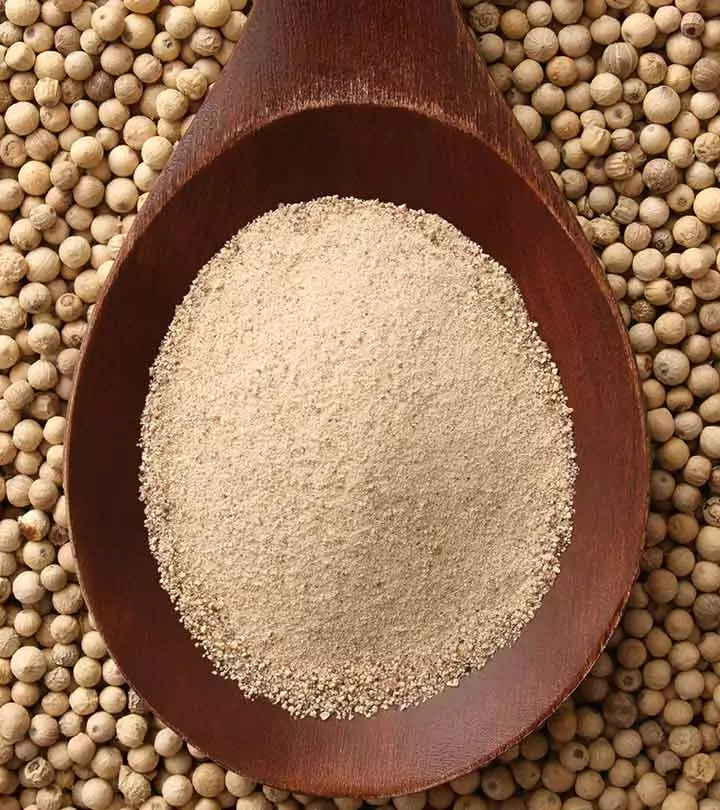
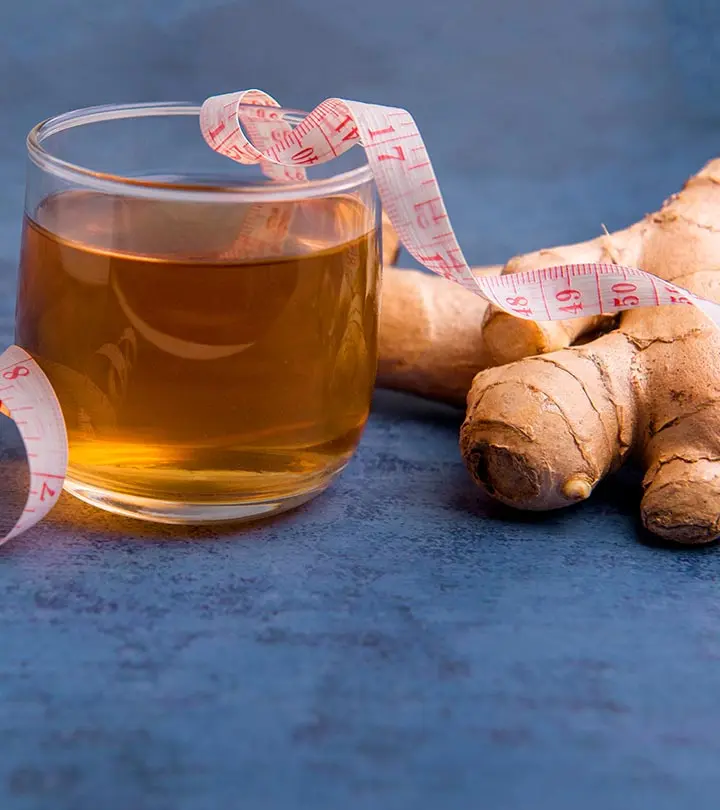


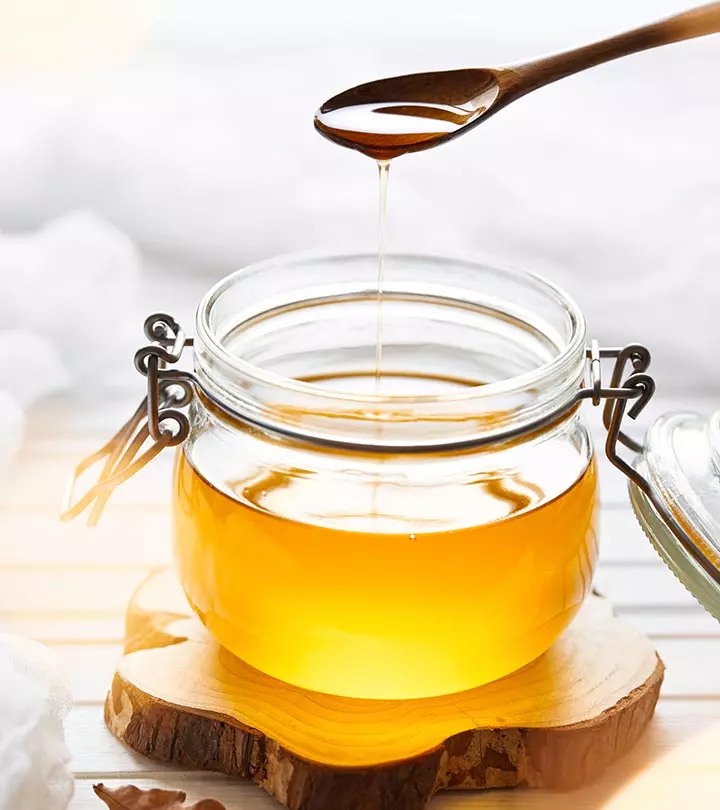
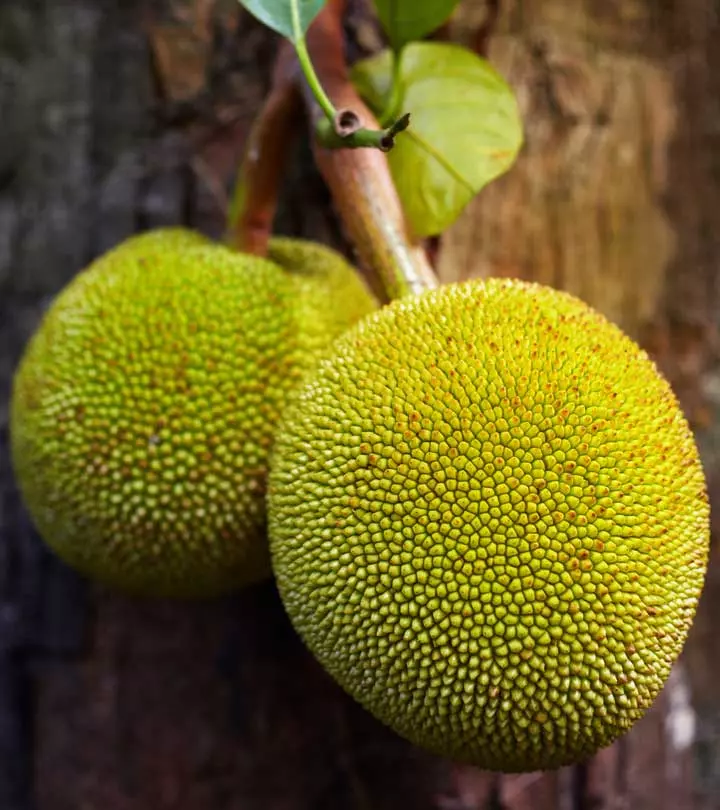



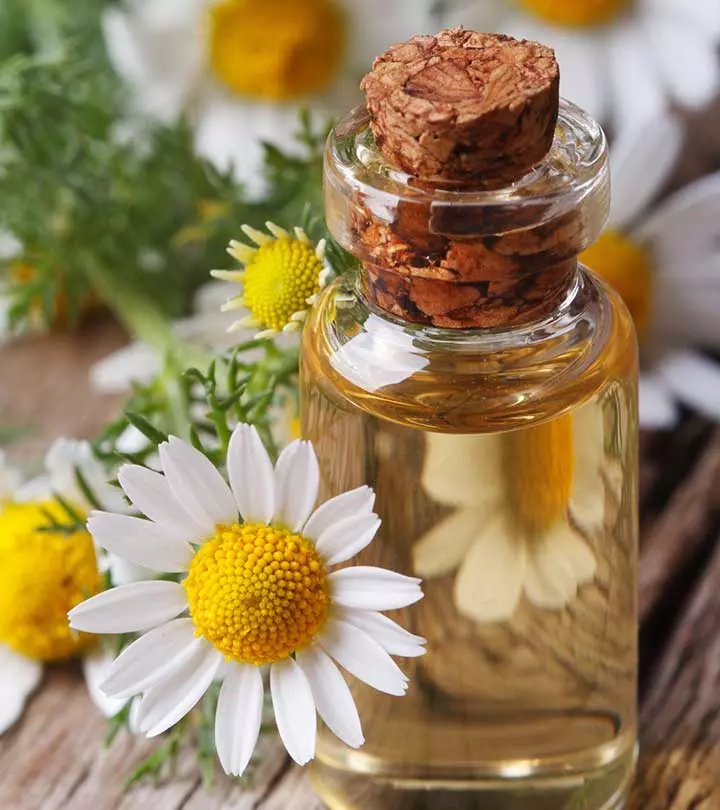
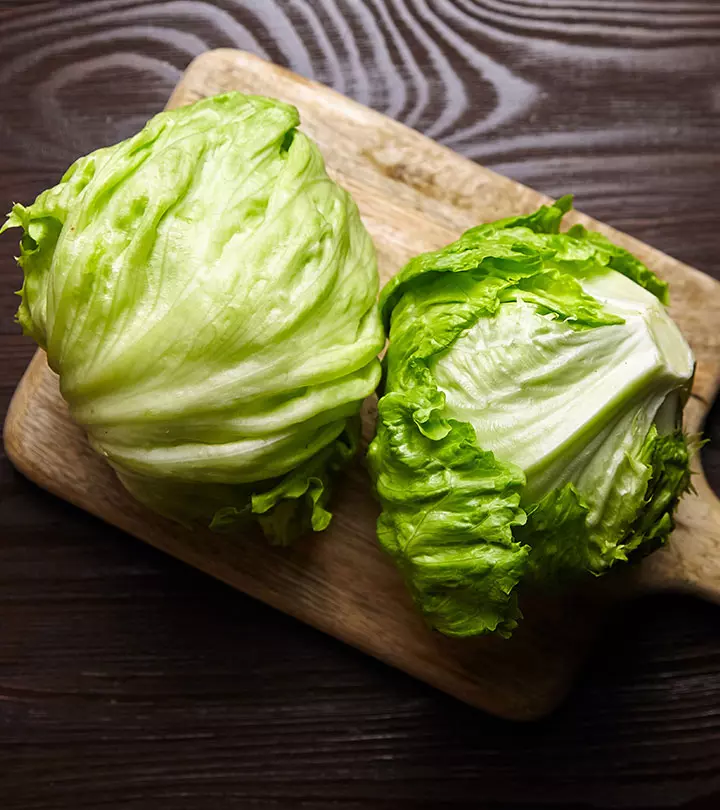
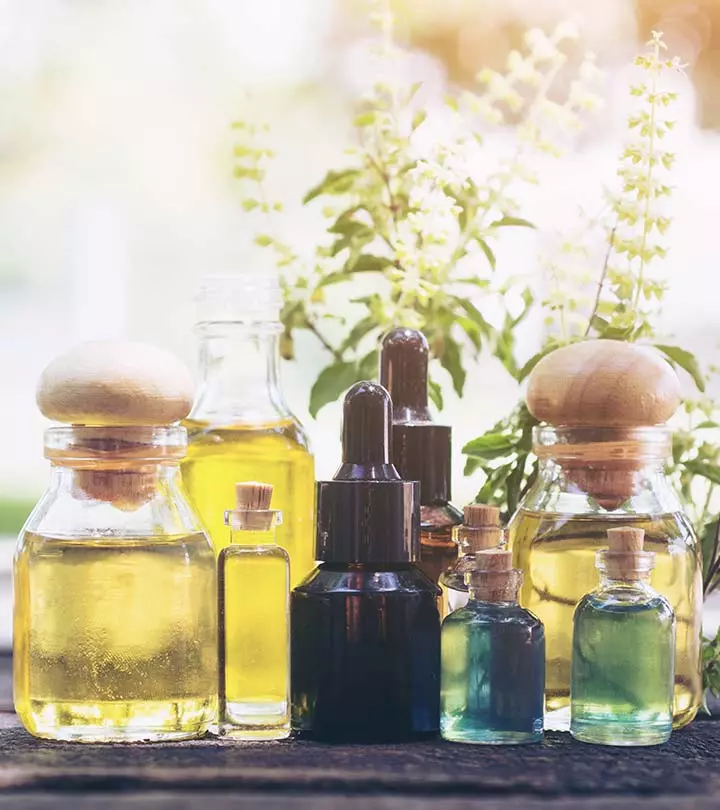
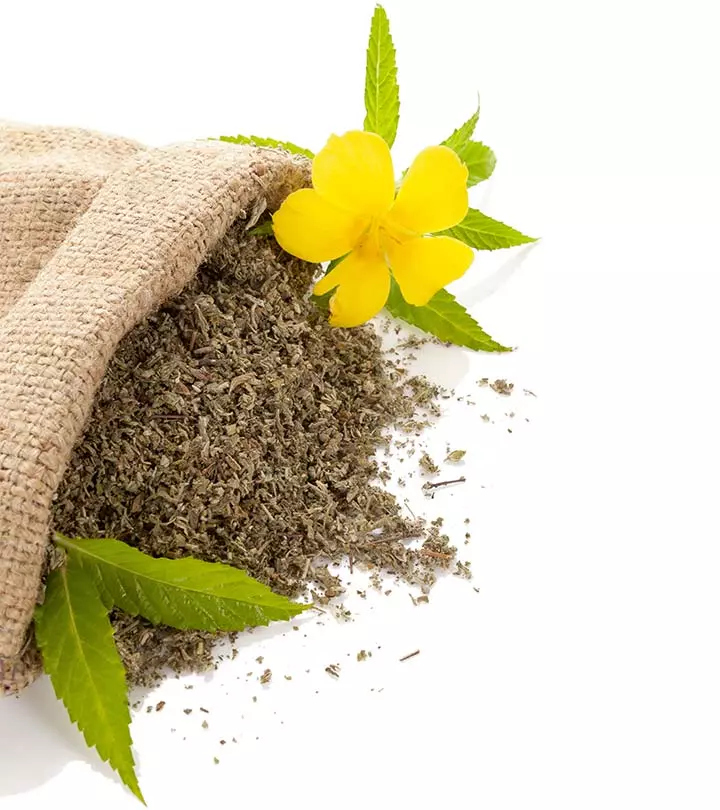
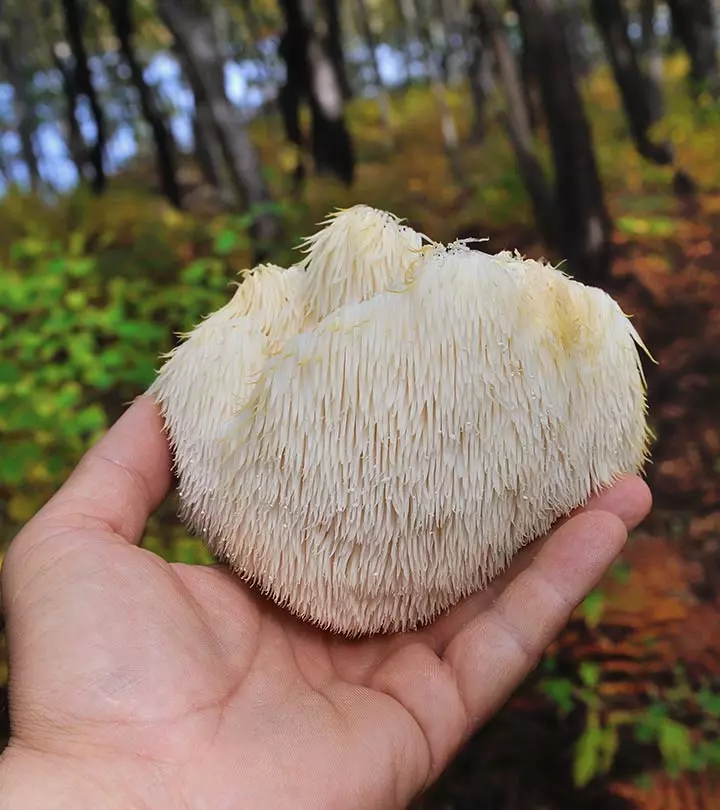
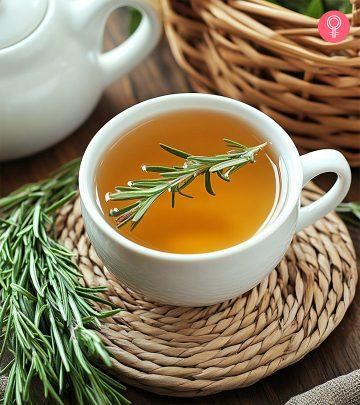
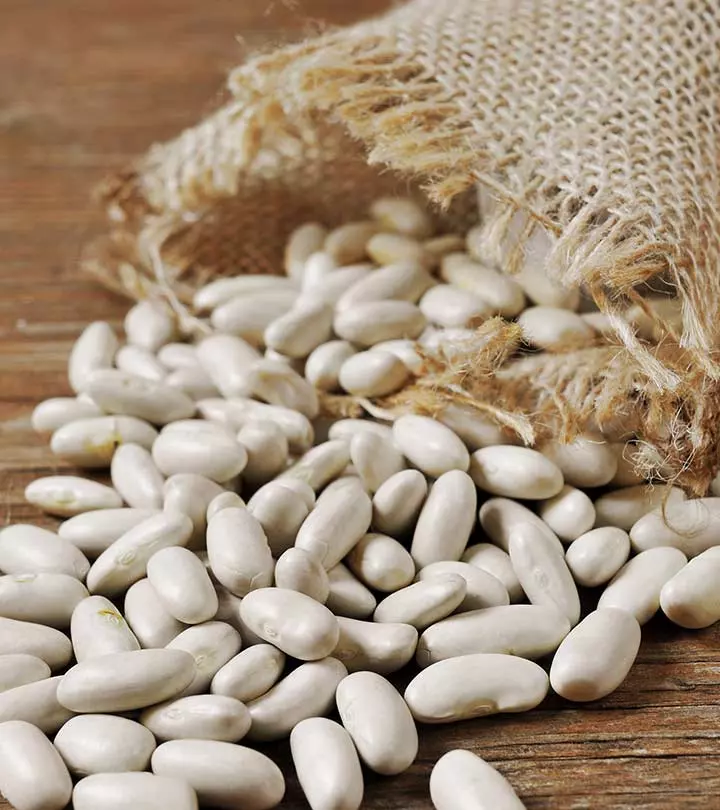
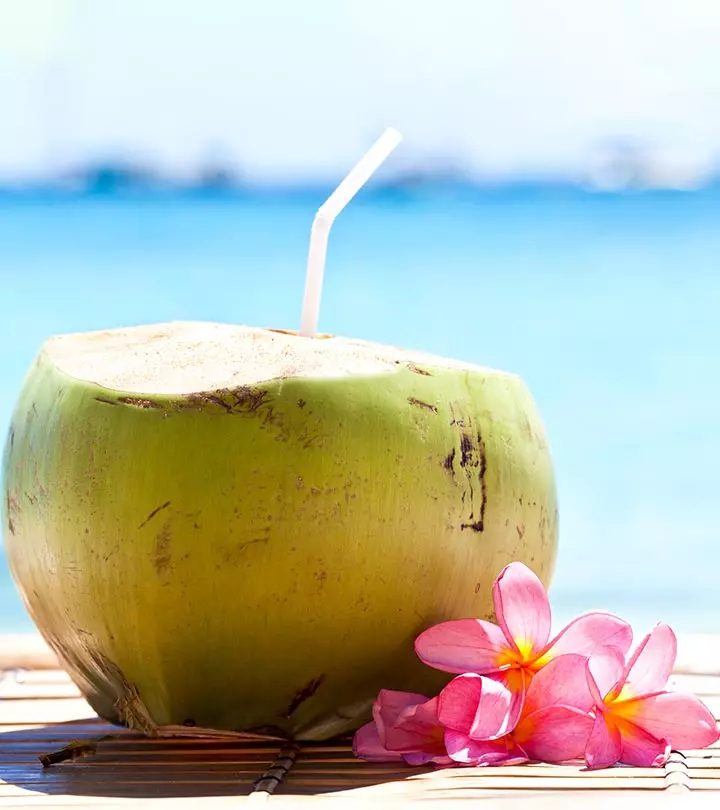
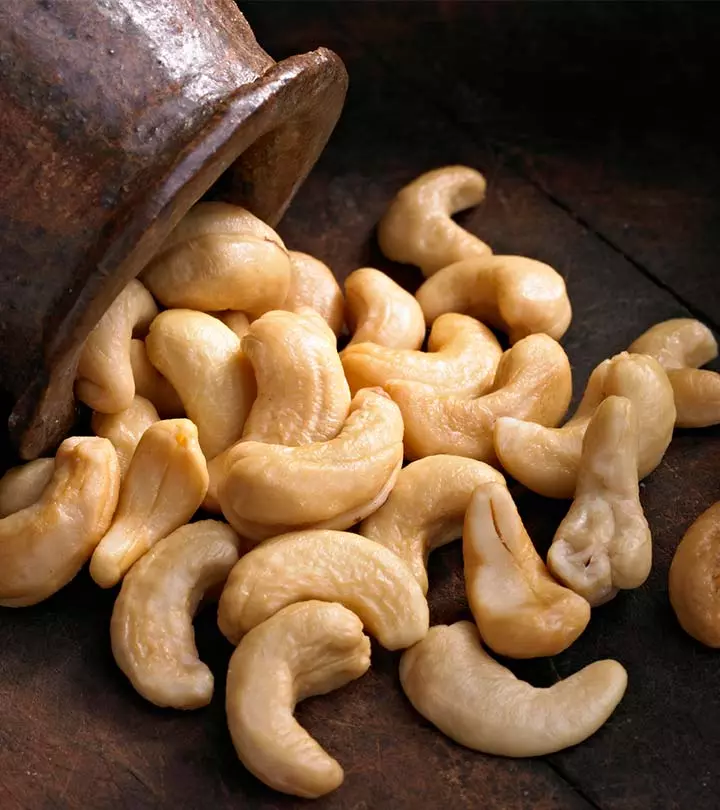

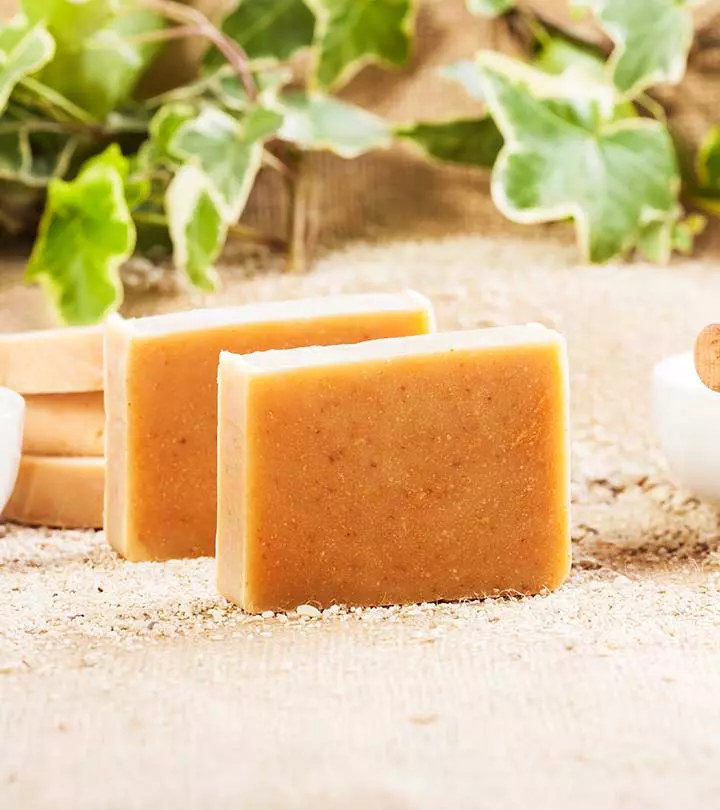
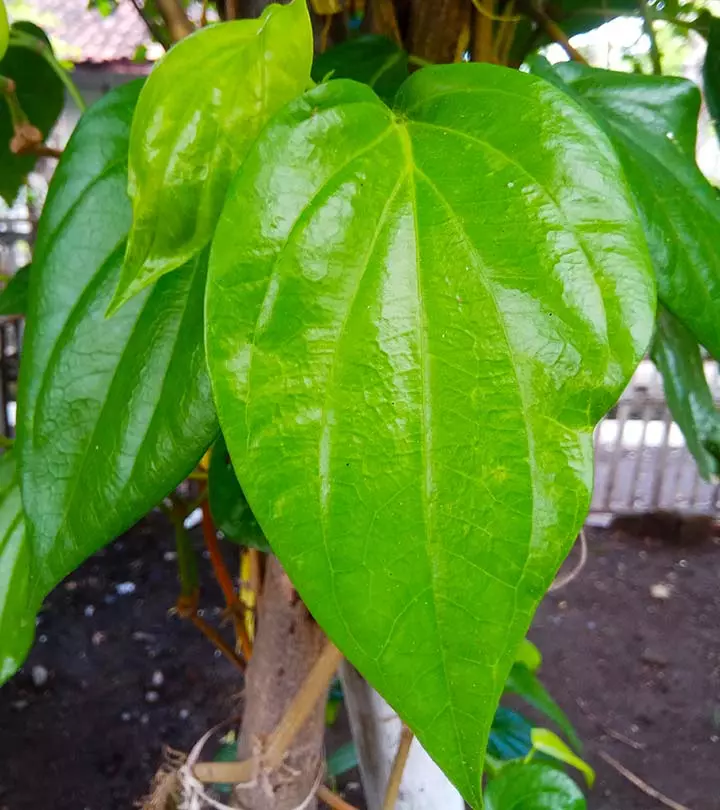

Community Experiences
Join the conversation and become a part of our empowering community! Share your stories, experiences, and insights to connect with other beauty, lifestyle, and health enthusiasts.